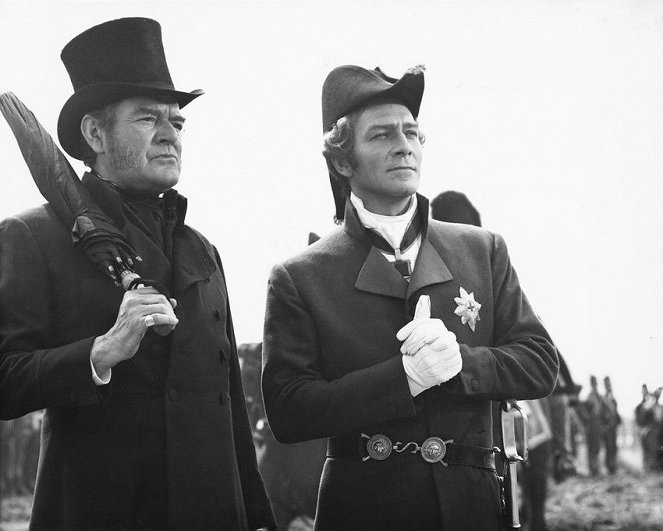Director:
Serguéi BondarchukGuión:
H.A.L. CraigCámara:
Armando NannuzziMúsica:
Nino RotaReparto:
Rod Steiger, Christopher Plummer, Orson Welles, Jack Hawkins, Virginia McKenna, Dan O'Herlihy, Rupert Davies, Philippe Forquet, Gianni Garko, Ivo Garrani (más)Streaming (1)
Sinopsis(1)
Napoleón Bonaparte, inspirando a su pueblo con su genio militar y su fervor revolucionario, logró convertirse en Emperador de Francia y amo de Europa. Pero tras 15 años de indiscutibles victorias encontró el fracaso en la Campaña Rusa en el año 1812. Un año después, acuartelado en París, se ve obligado a abdicar y forzado a retirarse a la isla mediterránea de Elba con una guardia personal de mil hombres. Tras diez meses Napoleón escapará de Elba para iniciar una nueva campaña con sus mil hombres a los que poco a poco se irán sumando más y más efectivos. El bando británico no puede tolerar que “El Monstruo” regrese de su exilio para conquistar nuevamente Europa, por lo que encargará a su mejor oficial, Arthur Wellesey, Duque de Wellington, la difícil labor de detener su avance. Se está preparando una batalla memorable y todos los indicios parecen indicar que el lugar escogido será la población belga de Waterloo… (Filmin)
(más)Reseñas (4)
Sergei Bondarchuk did not disappoint and populated the Belgian battlefield, only to subsequently depopulate it accordingly. The clash of three great military leaders of their time ended with a crushing defeat for one of them, and due to the tactics used at that time, the human losses were enormous (although, with gradually improving methods, these numbers are not decreasing). People simply never learn. The film's creators offered a nearly perfect interpretation of historical events in broad strokes (the details were not as perfect, but that is understandable - there wasn't enough time, and Waterloo had so much material it could have been turned into a series). The soundtrack was fantastic, and the performances were outstanding. As for the military leaders (not the ones in the film), Marshal von Blücher (aided by August von Gneisenau) won me over, as he strongly contributed to the alliance's success at the age of seventy-three, even while believing that he was pregnant and would give birth to an elephant. / Lesson learned: Do not praise the day before sunset.
()
This is exactly how big movies should be: Big! Great actors, a director who simply didn't struggle, 20,000 extras from the Red Army, an excellent soundtrack by Rota... And then, of course, THAT battle. The battle, which Bondarchuk shows us primarily as a duel between two strategists, is perfect - shots like the slow-motion attack of the Scottish cavalry, the "victory" march of the French Old Guard or the (believably constructed) battlefield with perfect formations shot from a helicopter are simply perfect. Steiger as Napoleon really rocks (the opening ten minutes alone!), but Plummer's Wellington is his equal opponent. Seeing it in the movie theatre would have to be really something.
()
The money of the Italian producer and Bondarchuk's ability to handle monumental scenes happily combined and led to the creation of a magnificent reconstruction of one of the most famous battles in history. It is quite possibly the pinnacle of its genre because nowadays, such a war epic with a cast of thousands can only be made in China, which is a completely different culture. Personally, I have a slight problem with this filmmaking style. It is too grand, the individual gets lost in it, and the camera's eye fondly rests on marching formations, waving flags, colorful uniforms, and famous commanders. Only the Soviet uniforms full of metals are missing. In a way, it really reminds me of Soviet society and its contempt for the individual. The camera work is excellent and the film has a strong cast, and personally, I have no problem with Rod Steiger's performance, who portrayed Napoleon as a somewhat mentally unstable and exhausted man past his prime. Overall impression: 80%.
()
In terms of large-scale magnificence and emphasis on detail, Bondarchuk is unrivalled. And that is a mistake, in a way, because Waterloo is basically approached and served up identically to Part III of War and Peace with the battle of Borodino. With a director of Bondarchuk’s capacity, I would expect something different from what he had already served up once before. And he proved during War and Peace that he can do it differently, too: each battle is a completely different kettle of fish. But make no mistake, my nitpicking sighs are silenced by the incredible camerawork and the entire second half with the battle itself. The “strategic" overview is absolute genius. I am surprised that nobody repeated this shot until Stone in Alexander. The only real problem is Rod Steiger who doesn’t do a very good job of Napoleon. He acts too hard and theatrically In the abdication, pre-credits scene and is often more of a caricature on Boney than the best person to act him. Even though he certainly has his strong moments. Apart from that, I don’t understand at all how the Bonaparte + Bondarchuk’s attempt at absolute historical correctness down to the last blade of grass + English language “equation" fits together. Exactly opposite to Steiger, we find Welles (despite spending almost no time on screen) and Christopher Plummer who couldn’t have been better from the very start.
()


Anuncio